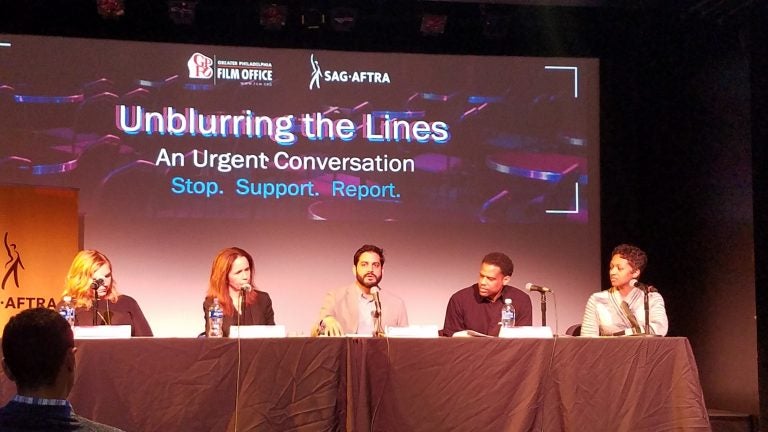Actors union presents guidelines on preventing sexual harassment
After deliberating for months, SAG-AFTRA produces a set of harassment-prevention guidelines. Philadelphia hosted the first discussion of the recommendations.
Listen 1:25
Adam Moore, national director of equal employment opportunity and diversity for SAG-AFTRA speaking at The Prince Theater, February 13, 2018 (Peter Crimmins/WHYY)
In the wake of widespread allegations of sexual misconduct against Hollywood titan Harvey Weinstein, human resource departments across the country have scrambled to make sure their employees are aware of what constitutes sexual harassment — and the laws that pertain to inappropriate behavior.
The Screen Actors Guild-American Federation of Television and Radio Artists has been deliberating since October to come up with its “four pillars of change” relating to inappropriate workplace activity: rules and guidelines; education; early intervention; and safety nets across the industry.
After the SAG guidelines were released over the weekend, the Prince Theater in Philadelphia hosted the first public forum on the recommendations Tuesday. The Philadelphia Film Office issued the invitation.
SAG-AFTRA anticipates that other industries will follow its lead in its efforts. The difficulty of assessing and reacting to inappropriate behavior is writ large in the TV and film professions, with its sometimes confusing boundaries of what is — and is not — appropriate on a shooting set. Sometimes a job will require actors to enter into emotionally or sexually vulnerable situations — shooting a nude scene, for example.
Adam Moore, SAG-AFTRA’s national director of equal employment and opportunities, said what happens with actors can have a ripple effect across society.
“What happens in this industry is incredibly visible, and we can lead by example and by modeling what can be possible in this sometimes fraught environment,” he said. “As good as we can do, it should be pretty easy for most other workplaces to do better as well.”
The challenges of standing up to sexual harassment in the workplace is magnified in the acting industry because it’s a gig economy where reputation is everything. Actors may be shy to call out inappropriate behavior for fear of being blacklisted as someone who complains a lot.
Offering merely legal advice could bring a sledgehammer into a situation requiring a scalpel. SAG-AFTRA spent four months carefully and deliberately drafting its guidelines. In an attempt to lead its industry and spur what it hopes will be a large societal change, the union clearly defined what constitutes illegal behavior. It advised its members that a situation does not have to escalate to that level before action can be taken.
“That can be a very isolating and lonely experience, when they feel they are experiencing something inappropriate,” said Mary Cavallaro, chief broadcast officer for the union. “When they are not sure if it’s illegal, but they have a concern that this is not feeling right. This is not the way it should feel at work.”
SAG-AFTRA stresses the importance of peer-support networks and mentor relationships so actors can help one another navigate industry pitfalls. Also, it suggested early intervention with an employer in order to stem uncomfortable behavior before it has a chance to escalate into harassment.
“If you feel if what you are being asked to do is not comfortable, you have the right to say so,” said Moore. “There are teams of lawyers who will help you, but in the moment, what are you supposed to do to make your way through a career and not piss off someone who might give you a job?”
All SAG-AFTRA’s guidelines and its “pillars of change” are available to anyone, dues-paying member or not, as downloads from its website.
WHYY is your source for fact-based, in-depth journalism and information. As a nonprofit organization, we rely on financial support from readers like you. Please give today.





